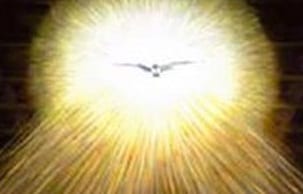
The Sending of the Holy Spirit
Scripture Passages
Jesus said to His disciples, “I will ask the Father, and He will give you another Advocate to be with you always, the Spirit of truth, which the world cannot accept, because it neither sees nor knows it. But you know it, because it remains with you, and will be in you.” (John 14:16-17)
“The Advocate, the Holy Spirit that the Father will send in my name — He will teach you everything and remind you of all that I told you.” (John 14:26)
“When the Advocate comes whom I will send you from the Father, the Spirit of truth that proceeds from the Father, He will testify to me.” (John 15:26)
“When He comes, the Spirit of truth, He will guide you to all truth. He will not speak on His own, but He will speak what He hears, and will declare to you the things that are coming. He will glorify me, because He will take from what is mine and declare it to you. Everything that the Father has is mine; for this reason, I told you that He will take from what is mine and declare it to you.” (John 16:13-15)
Church teaching
At the Last Supper, before His Passover, Jesus announced the sending of “another Advocate” – the Holy Spirit. The Holy Spirit has been at work since creation and has “spoken through the prophets;” but now, the Holy Spirit will be with and in the disciples, to teach them and guide them “into all the truth.” In this way, the Holy Spirit is thus revealed as another divine person with Jesus and the Father. (cf. CCC 243)
The eternal origin of the Holy Spirit is revealed in His mission in time. The Spirit is sent to the apostles and to the Church both by the Father in the name of the Son, and by the Son once He had returned to the Father. The sending of the person of the Holy Spirit after Jesus’ glorification reveals in its fullness the mystery of the Holy Trinity. (cf. CCC 244)
The apostolic faith concerning the Holy Spirit was confessed by the second ecumenical council at Constantinople (381 AD): “The Holy Spirit, the third person of the Trinity, is God, one and equal with the Father and the Son, of the same substance and also of the same nature… Yet He is not called the Spirit of the Father alone… but the Spirit of both the Father and the Son.” The Creed of the Church from the Council of Constantinople confesses: “With the Father and the Son, He is worshipped and glorified.” (cf. CCC 245)
The Latin tradition of the Creed confesses that the Holy Spirit “proceeds from the Father and the Son (filioque).” The Council of Florence in 1438 AD explains: “The Holy Spirit is eternally from Father and Son; He has His nature and subsistence at once (simul) from the Father and the Son. He proceeds eternally from both as from one principle and through one spiration… And, since the Father has through generation given to the only-begotten Son everything that belongs to the Father, except being Father, the Son has also eternally from the Father, from whom He is eternally begotten, that the Holy Spirit proceeds from the Son.” (CCC 246)
Commentary
A good way to understand the three Persons of the Holy Trinity is that when we profess that “the Son is begotten of the Father” and that “the Holy Spirit proceeds from the Father and the Son”, we shouldn’t think of God in human terms that one Person is born after another Person sequentially. We, human beings, while in this world, live according to time; therefore, children are born from parents, parents are born from grandparents, and so forth – for human beings, coming into existence in this world happens sequentially. But God is eternal, therefore God is not governed by time. When we say that the Son is begotten of the Father, it doesn’t mean that the Father existed before the Son because the Father and the Son are co-eternal. In the same way, when we say that the Holy Spirit proceeds from the Father and the Son, it doesn’t mean that the Father and the Son existed before the Holy Spirit because all three Persons of the Holy Trinity are co-eternal.
The three Persons of the Holy Trinity are distinguished from each other according to relation. When we speak of the First Person of the Trinity as the Father, it distinguishes the First Person from the Second and Third Persons, and it identifies the First Person’s relationship to the Second Person, as the Father of the Son. When we speak of the Second Person of the Trinity as the Son, it distinguishes the Second Person from the First and Third Persons, and it identifies the Second Persons’ relationship to the First Person, as the Son of the Father. When we speak of the Third Person of the Trinity as the Holy Spirit, it distinguishes the Third Person from the Frist and Second Persons, and it identifies the Third Person’s relationship to the First and Second Persons, as the Holy Spirit who proceeds from the love of the Father to the Son, and the love of the Son to the Father.
Why is it necessary to learn about the Holy Trinity?
- It helps us to know the three different Persons in one God.
- It gives us an idea of the intimate love in the three Persons.
- It gives us a basis for understanding the other mysteries of the faith.
Questions for reflection
- How does my knowledge of the Holy Trinity help me in my relationship with God?
- The Holy Spirit is God. What are the ways in which I can pray to the Holy Spirit?